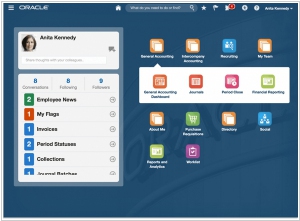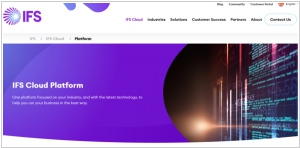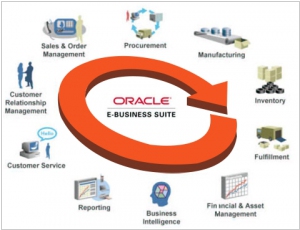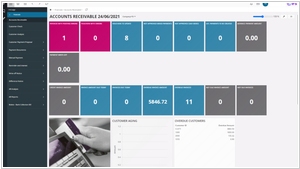IFS vs Oracle ERP
June 13, 2023 | Author: Michael Stromann
14

Oracle Enterprise Resource Planning (ERP) Cloud is a suite of cloud applications for finance, project management, procurement, risk management, and other core day-to-day activities important in every business, regardless of size, industry, or geography. Designed from the ground-up with a modern architecture and technology, Oracle ERP Cloud is natively connected with all Oracle enterprise cloud applications and scales inherently to support added users, transactions, and sites as your business grows by size and into new markets across your country or the globe.
IFS and Oracle ERP are two prominent enterprise resource planning (ERP) solutions that cater to different segments of the market.
IFS is known for its strong focus on industries such as manufacturing, construction, and service management. It offers a comprehensive suite of ERP modules that cover various business functions, including supply chain management, project management, asset management, and financials. IFS emphasizes usability and flexibility, with a user-friendly interface and the ability to adapt to specific industry requirements. It also offers features like field service management and mobile functionality, making it suitable for businesses with complex operational needs.
Oracle ERP, on the other hand, is a widely adopted ERP system known for its scalability and extensive range of modules. It provides robust functionality across finance, procurement, supply chain, human resources, and customer experience. Oracle ERP is designed for large enterprises and multinational organizations that require a highly integrated and customizable solution. It offers advanced analytics, artificial intelligence capabilities, and industry-specific solutions to support complex business processes and regulatory compliance.
In terms of implementation and licensing costs, Oracle ERP tends to have higher upfront costs and may require more resources for implementation and maintenance. IFS, on the other hand, is often regarded as a more cost-effective option, particularly for mid-sized organizations.
See also: Top 10 Online ERP software
IFS is known for its strong focus on industries such as manufacturing, construction, and service management. It offers a comprehensive suite of ERP modules that cover various business functions, including supply chain management, project management, asset management, and financials. IFS emphasizes usability and flexibility, with a user-friendly interface and the ability to adapt to specific industry requirements. It also offers features like field service management and mobile functionality, making it suitable for businesses with complex operational needs.
Oracle ERP, on the other hand, is a widely adopted ERP system known for its scalability and extensive range of modules. It provides robust functionality across finance, procurement, supply chain, human resources, and customer experience. Oracle ERP is designed for large enterprises and multinational organizations that require a highly integrated and customizable solution. It offers advanced analytics, artificial intelligence capabilities, and industry-specific solutions to support complex business processes and regulatory compliance.
In terms of implementation and licensing costs, Oracle ERP tends to have higher upfront costs and may require more resources for implementation and maintenance. IFS, on the other hand, is often regarded as a more cost-effective option, particularly for mid-sized organizations.
See also: Top 10 Online ERP software
IFS vs Oracle ERP in our news:
2021. IFS Launches IFS Cloud

IFS has introduced IFS Cloud, a unified platform that seamlessly integrates all of its products to provide comprehensive capabilities for managing customers, personnel, and assets. This platform enables customers to choose between deploying best-of-breed solutions or harnessing the power of interconnected value chains across various functionalities, including enterprise resource planning (ERP), customer relationship management (CRM), human capital management (HCM), asset management (EAM), and field service (FSM). With IFS Cloud, the company delivers a distinctive technology platform that offers a unified user experience, a standardized data model, and consistent support services. IFS Cloud brings simplicity, flexibility, and innovation to organizations seeking to adapt to new business models, optimize costs, expand rapidly, and enhance customer service. By adopting IFS Cloud, companies can easily scale their operations and seamlessly activate new functionalities, such as additional modules or innovative capabilities, when the timing aligns with their business requirements.
2014. Oracle E-Business Suite unveiled cloud-centric apps

Oracle has recently updated its ERP solution, E-Business Suite, with enhanced integration with the company's cloud services and improved tablet compatibility. The Financials module now integrates with Oracle Revenue Management Cloud, allowing users to take advantage of the revenue compliance and recognition benefits offered by that product. Furthermore, enhancements in Project Contracts and Project Billing enable U.S. federal contractors to optimize cash flow, increase transparency, and automate billing processes. The Purchasing module has also received improvements to enhance buyer productivity when handling large orders. These changes include the introduction of Web ADI-enabled spreadsheet creation and modifications to purchase order lines, schedules, and distributions. Web ADI, also known as Applications Desktop Integrator, is Oracle's tool for integrating its applications with Microsoft Excel.



